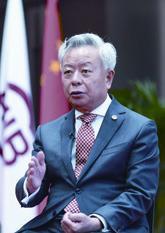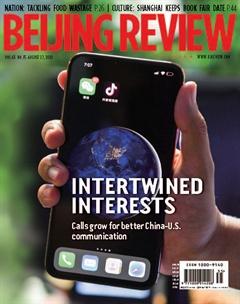Flying High
By Wen Qing

A fter the outbreak of the novel corona- virus disease (COVID-19) pandemic, the Asian Infrastructure Investment Bank (AIIB) launched the COVID-19 Crisis Recovery Facility to support its members and clients to alleviate and mitigate economic, fi nancial and public health fallout.
Over the 18 months from April 2020 to October 2021, the facility is offering up to$13 billion worth of financing to both public and private sector entities for any AIIB member facing, or at risk of facing, serious adverse impacts as a result of COVID-19. To date, nearly $6 billion worth of loans has gone out to 12 members including Indonesia, Pakistan, India, the Philippines and Kazakhstan. It brought AIIBs total investment portfolio since 2016 to nearly $20 billion.
“At a time when many countries are amassing all of their scarce domestic resources to contain and reverse the epidemiological and economic effects of the pandemic, AIIB loans are coming at the most opportune time,” said U Soe Win, Vice Chairman of the Board of Governors of AIIB and Union Minister for Planning, Finance and Industry of Myanmar, at the AIIB annual meeting held via video link on July 28.
Myanmar is eligible for these loans, providing much-needed financial resources to buffer against the multidimensional impacts of the pandemic, he said.
The Crisis Recovery Facility is a typical example of AIIBs increasingly active role since its establishment. “With support from all members and fi ve years of persistent efforts, AIIBs institutional construction and operational development have made considerable progress, which has been widely recognized and highly praised by the international community. It has developed into a professional, effi cient and clean multilateral development bank,” Jin Liqun, President of AIIB, said on July 28.
A look back, a look forward
A famous Chinese saying stresses the key role of infrastructure in economic and social progress: “If a region wants to develop and prosper, it should start with building roads.”
However, many developing countries in Asia and other parts of the world have long been troubled by a lack of investment in infrastructure construction and upgrading. To address this shortage, in 2013, China proposed AIIB, which was launched in January 2016. The aim was to provide participating countries with an efficient financing channel for infrastructure projects and promote regional connectivity and integration.
Since its founding, AIIBs members have expanded from 57 to 103, spanning Asia, Europe, Africa, North America, South America and Oceania. It has invested in sustainable infrastructure and other productive sectors in Asia and beyond and become the second largest multilateral development bank in the world.
Looking to the future, Chinese President Xi Jinping said at the AIIB annual meeting that the bank is expected to become a new platform for promoting development for all its members and facilitating the building of a community with a shared future for humanity.
AIIBs loans produce tangible benefits for people of recipient countries. For example, Padmo Para, a remote Bangladeshi village, had no electricity until 2018. But it is now electrified thanks to a project financed by AIIB. The $165-million was designed to expand electricity coverage to benefi t 12.5 million people in rural areas in Bangladesh.
Moreover, AIIB is committed to green development. It has launched a project called the Asia Climate Bond Portfolio, aimed at enhancing climate fi nancing in capital markets. In an interview with China Global Television Network on July 28, Stefen Shin, Principal Investment Officer at AIIBs Investment Operation Department, said, “AIIB is going to invest $500 million in its members and the portfolio will purchase about 40-50 bonds,”These bonds will be from “climate champions,” companies that perform well in the three primary areas of the response to global warming cited by the Paris Agreement: mitigation, adaptation and resilience.
AIIB takes a tough stance against corruption and has designed various mechanisms to combat it. For example, the Compliance, Effectiveness and Integrity Unit mainly engages in anti-corruption oversight during project implementation to ensure that loans are not embezzled. The Ethics Office oversees and disciplines employees, including board members, and independently investigates reports or whistleblowing. The Internal Audit Department has the power to review any AIIB branch.
Jin emphasized the vital role of leadership in the implementation of these measures.“It has been stressed over and over again that we must never seek personal gain,” he said. “If the president violates disciplinary rules, the Ethics Office can directly report it to the Board of Directors, and they will make a decision about the penalty, including impeachment.”
Multilateral efforts


